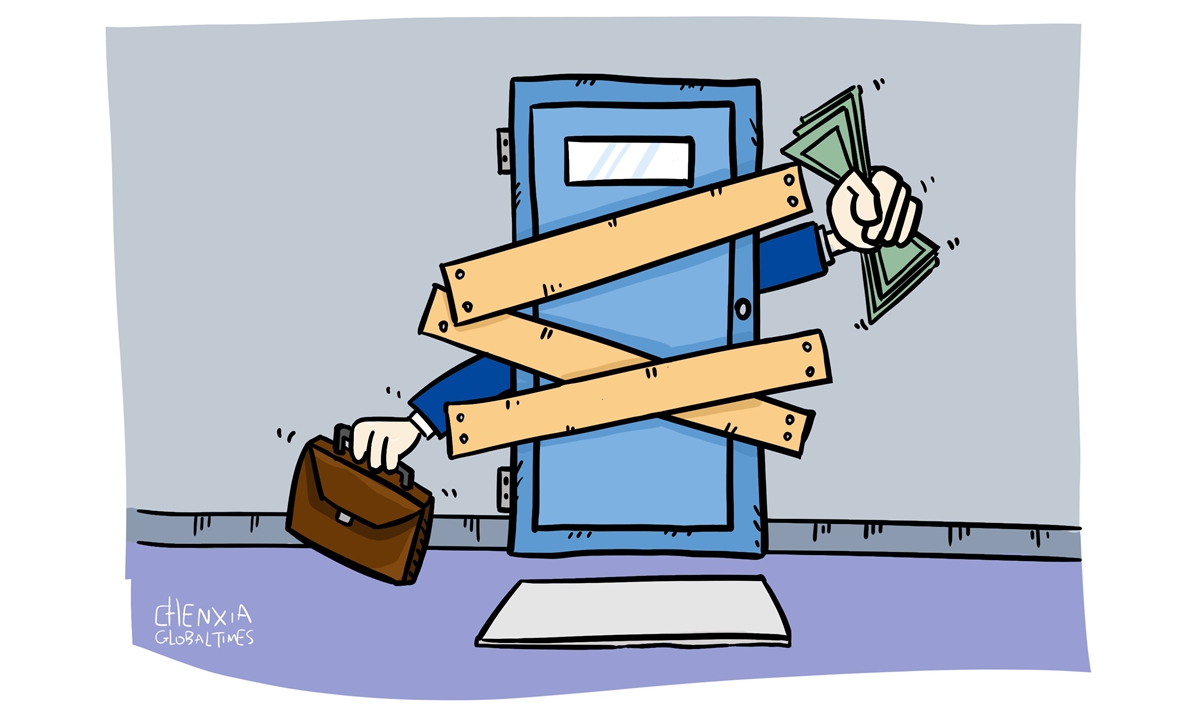
Illustration: Chen Xia/GT
The outgoing Trump administration is getting more reckless and unbridled in its waning days before a new government is inaugurated and takes over. The China hawks in the scandal-ridden administration are hardening attacks on major Chinese companies, determined to send already fraught relations with Beijing to new lows for its anti-China grandstanding, as well as binding the hands and feet of the next administration.
Despite facing an unprecedented second impeachment for inciting a mob attack on the US Congress, which sent hundreds of American lawmakers into hiding for personal safety, Trump last week ordered the addition of more Chinese high-tech companies on an investment blacklist, imposing higher barriers for Chinese companies to access the US capital market, just days after delisting China's three largest telecom carriers from the New York Stock Exchange.
Under the terms of an executive order issued by Trump, Xiaomi, the world's third-largest smartphone maker, will see American investors barred from buying its securities and they will have to dump their existing holdings within 12 months. The administration alleges the company has links to China's military, which is actually a leading vendor of digital devices and smart home appliances. Chinese passenger jet maker Commercial Aircraft Corp of China (Comac), Shanghai-listed Advanced Micro-Fabrication Equipment Inc. and six other companies were also added to the list.
Prior to the order, the world saw the administration's "flip-flop-flip" or double reversals on a decision to oust China Telecom, China Mobile and China Unicom stocks from NYSE, a move that raised global eyebrows as the Trump administration ran afoul to ruthlessly assault normal trading of securities, even at the expense of many US investors, who were forced to sell off Chinese equities at sharply depressed prices.
Further to this, US press reports revealed that Trump's administrative team only omitted Alibaba, Tencent and Baidu from the same list as Xiaomi and Comac, on the consideration that the move will cause a severe blow to market order in the US and beyond. Some analysts say putting the three tech giants on the list will cause a seismic tremor to shake stability of the US financial system.
The focus on Chinese technology companies in the last days before President-elect Joe Biden comes to power on January 20 is a clear testament to an administration that has made countering and impeding the rise of an economic juggernaut, now running in parallel with the US, a centerpiece of its "political legacy".
The legacy also includes a trade war with China of a historical scale, which disrupted global supply chains, made many American enterprises and households' livelihoods more difficult, but in the end, failed to narrow the trade gap between them and the US was left with a deeper trade deficit in 2020. The administration also poisoned people-to-people exchanges, by restricting Chinese students and scholars and shutting down the Chinese consulate office in Texas.
Over the past four years, the Trump administration's rage and fire have concentrated on Chinese high-tech companies - the eyesores of those China hawks who are seen increasingly bare-knuckled to pummel Chinese technology upstarts to curtail the country's growth.
Washington's crackdown on Huawei Technologies is among the most belligerent and unrelenting, so outrageous by ordering third-party semiconductor manufacturers that use only a trifling of US technology not to produce Huawei's self-designed 5G microchips, or they will face severe US government punishment.
Other promising Chinese technology companies that were put on the US Commerce Department's Entity List include AI, industrial robotic, semiconductor and laser technology upstarts such as IFLYTek, SMIC, Megvii, SenseTime, Yitu Technologies, Yixin Science and Technology, Beijing Cloudmind Technology, Skyeye Laser Technology, as well as DJI, the world's top commercial drone maker, Hikvision, a leading surveillance camera maker and Qihoo 360 Technology, a major cyber-security software company.
State-run giants including China Electronic Technology Group, Aviation Industry Corporation of China (AVIC), China Communications Construction Company and China Shipbuilding Group were also placed on the US crackdown list.
The targeted companies bear the hallmark that they constitute the backbone technologies and industries that will enable China to compete with the US in the 21st century. The Trump administration is purposeful to slow down China's meteoric ascent since 1980 and prevent a major power from chipping away at Washington's global predominance. If China is subdued, the US could perpetuate in controlling international affairs, threatening the weak and poor nations, and coercing them to cower to the US' morbid interests.
The escalation in oppressing high-tech Chinese companies and decoupling them from US investors is premeditated by the unruly Trump administration to bind Biden's hands, forcing the new government to continue Trump's notorious pedigree of confronting China.
This explains why China's policymakers have instituted a major change to economic development strategy by investing heavily in domestic technology innovation and relying on home market circulation, to deflect the US' economic and technology attack. Meanwhile, China's giant market will be further opened to all the friendly countries.
The author is an editor with the Global Times. bizopinion@globaltimes.com.cn




